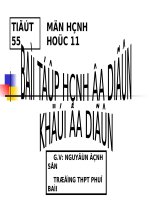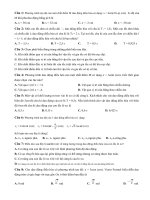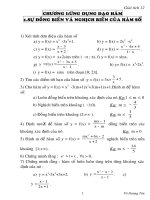BAI TAP PHU DAO TA 12
Bạn đang xem bản rút gọn của tài liệu. Xem và tải ngay bản đầy đủ của tài liệu tại đây (120.44 KB, 5 trang )
<span class='text_page_counter'>(1)</span><div class='page_container' data-page=1>
<b>REPORTED SPEECH</b>
<b>I. Statements in reported speech:</b>
Câu trần thuật trong lời nói gián tiếpĐể đổi một câu trần thuật từ trực tiếp sang gián tiếp ta cần có những thay đổi sau.
1. phải dùng động từ giới thiệu say (said) hoặc tell (told) .
2
. đổi các đại từ nhân xưng, đại từ hoặc tính từ sở hữu sao cho tương ứng với chủ ngữ hoặc
tân ngữ của mệnh đề chính.
S
←→
O
she her
he him
it it
I me
we us
you you
they them
3. đổi một số tính từ chỉ định, trạng từ hoặc cụm trạng từ chỉ nơi chốn, thời gian:
<b>DIRECT</b> <b>INDIRECT</b>
this / these that / those
here / now there / then
today / tonight that day / that night
ago before
tomorrow the following/ day / the next/ day
yesterday the day before / the previous day
next week/month/year/ ... the following week/month/year/ ...
last week/month/year/ ... the week/month/year/ ... before
4. đổi thì của động từ thành thì quá khứ tương ứng (ta phải lùi thì)
<b>DIRECT</b> <b>INDIRECT</b>
Simple present Simple past
Present continuous Past continuous
Present perfect Past perfect
Simple past Past perfect
Past continuous Past perfect continuous
Simple future Future in the past
Future continuous Future continuous in the past
may might
can could
must must / had to
* Ex: He said: “I’ll take a computer course next week.”
→ He said that he would take a computer course the following week.
* Ex: She said to me: “I saw them at this place last night.”
→ She told me she had seen them at that place the night before.
* Ex: My friend said: “I am doing my homework now.”
→ My friend said that she was doing her homework then.
<b>II.</b>
<b>Questions in indirect speech:</b>
Câu hỏi trong lời nói gián tiếp: Khi ta đổi câu hỏi từ trực tiếp sang gián tiếp thì <b>thì của động từ, đại từ, tính từ sở hữu, trạng từ chỉ thời gian và</b>
<b>nơi chốn được thay đổi giống cách đổi trong câu trần thuật</b> (When we turn direct questions into indirect speech,
tenses, pronouns and possessive adjectives, and adverbs of time and place change as in statements):
<b>1. Yes-No questions</b>:
* Form:
<b>S1 + động từ giới thiệu + O + if/whether + S2 + V</b>
+ động từ giới thiệu : <b>ask, wonder, want to know, require, ...</b>
Ex: He said to me : “Can you speak English?” → He asked me if I could speak English.
</div>
<span class='text_page_counter'>(2)</span><div class='page_container' data-page=2>
<b>2</b>. <b>Wh-questions:</b>
* Form:
<b>S1 + động từ giới thiệu + what/when/where/why/who/ ...+ S2 + V </b>
+ động từ giới thiệu : <b>ask, wonder, want to know, require, ...</b>
Ex: He said to me: “What are you doing now?” → He asked me what I was doing then.
She said: “What time does the film begin?” → She wanted to know what time the film began.
<b>III. Indirect commands: Câu cầu khiến gián tiếp</b>
Lời hứa , lời đồng ý, mệnh lệnh, lời đề nghị, lời yêu cầu, lời khuyên, ...thưòng được thuật lại theo các cách sau:
1. Form
<b>S + động từ giới thiệu + O + (not / never) to-inf</b>
+ động từ giới thiệu : <b>order, tell, request ,command, invite, advise, promise warn, beg, ask, remind, .. </b>
Ex: He said to me, “Do your homework carefully.” → He asked me to do my homework carefully
They said, “Don’t leave the room.” → They ordered us not to leave the room.
2. Form:
<b>S + động từ giới thiệu + (O) + pre + V-ing</b>
+ động từ giới thiệu : dream of, accuse of, insist on, congratulate (s.o) on, apologise to s.o for/apologise for, prevent
s.o from, thank s.o for, ...
Ex: Tuan said, “You’ve won the scholarship. Congratulations, Lan!”
→ Tuan congatulated Lan on winning the scholarship.
Ex: My friend said, “I’m sorry. I was so impolite to you yesterday.”
→ My friend apologised for being so impolite to me the day before.
3. Form:
<b>S + động từ giới thiệu + V-ing</b>
+ động từ giới thiệu : deny, admit, suggest, ...
Ex: “Yes. You’re right. I broke the vase while cleaning the table.” said she.
<b> </b>→ She admitting breaking the vase while cleaning the table.
Ex: He said, “Let’s go to the cinema.”
→ She suggested going to the cinema.
<b>IV. EXERCISES ON REPORTED SPEECH</b>
<i><b>a) Change these sentences into indirect speech:</b></i>
1.He said: “I’ve bought her a diamond ring”→ ...
2.“I’m going to Hue next week.”, Tuan said → ...
3.She said to me: “We’ll come to see you tomorrow.’ → ...
4. The woman said: “I came back from the USA three weeks ago.”
→ ...
5.They said: “We got home late last night.” → ...
6.Tom said: “I’m studying at home today.” → ...
7. He said: “Why are you so sad, Lan?” → ...
8.The teacher said: “Do you understand this lesson?”→ ...
9.He said: “Has Mary spent all the money?” → ...
10.He said: “How will she get there?” → ... ...
11.I said: “Where do you live, Nam?” → ...
12.He said to her: “Please lend me this book” → ...
13.He said to his friend: “Did you see the accident yesterday?”
→ ...
14.He said: “I will come here to take this book” → ...
15.Daisy said: “Where are you going for your holidays, Mary?”
→ ...
16.She said: “Bill came to see us yesterday.” → ...
17.He said to me: “Do you like coffee?” → ...
18.He said: “Don’t sit on my hat, the boy!” → ...
19.Mary said to John: “Open the box for me, please!”
→ ...
20.“I’m sorry I couldn’t come on Saturday,” said David.
→ ...
21.“Why don’t we go back to Singapore?” I said → ...
22.“No. It’s not true. I didn’t cheat in the exam.” Tom said
</div>
<span class='text_page_counter'>(3)</span><div class='page_container' data-page=3>
→ ...
24.“Congratulations! You won the English Quiz, Mary!” the teacher said
→ ...
25.“It was nice of you to invite me to the dinner. Thank you, Peter!” Miss White said
→ ...
26.“Remember to buy some bread! Said Paul. → ...
27.“Put everyrthing in the right place” the man said to the children
→ ...
28.“I’ll be at your house before 8:00, Sue.” Said Mike.
→ ...
29.“How about going for a walk?” said Nick → ...
30.“Don’t forget to come to the meeting tomorrow.” said the manager
→ ...
<i><b>b) Choose the best answer:</b></i>
1. The woman asked ... get lunch at school.
A. can the children B. whether the children could C. if the children can D. could the children
2. Did they say they ... me again?
A. will telephone B. have telephoned C. would telephone D. had telephoned
3. Peter said that if he ... rich, he ... a lot.
A. is – will travel B. were – would travel C. was – would have travelled D. had been – would have travelled
4. Someone told us ... on the stairs.
A. don’t sit B. not sit C. not to sit D. to not sit
5. All the students denied ... anything about the matter.
A. to know B. knowing C. for knowing D. that they know
6. They said that they had come back ...
A. the following day B. the next day C. the day after tomorrow D. the previous day
7. Martha ... she would be late for the meeting. She ... she was feeling ill.
A. told that – said that B. told that – said me that C. told me that – said me that D. told me that – said that
8. They asked me ... in Los Angeles then.
A. whether was my father working B. if my father was working
C. whether my father had been working D. was my father working
9. The doctor has advised ... too much coffee.
A. me not drink B. I don’t drink C. me not drinking D. me not to drink
10. They asked me how long did it take to get to Paris by train.
A B C D
11. My mother told me to watch the milk and don’t let it boil over.
A B C D
12. The teacher advised us ...
A. to be careful when doing these exercises B. be careful when doing these exercises
C. careful when doing these exercises D. are careful when doing these exercises
13. She told me ...
A. shut the door but don’t lock it B. shut the door but not lock it
C. to shut the door but not lock it D. to shut the door but not to lock it
14. He told me ...
A. think well before I answered B. think well before I answer
C. to think well before I answered D. to think well before I will answer
15. “Don’t play video games all the time!”, he said.
A. He told the boy not to play video games all the time. B. He said to the boy not play video games all the time
C. He told to the boy not to play video games all the timeD. He said the boy not to play video games all the time
16. He said “I bought these books last week”.
A. He said he bought these books last week B. He said he had bought these books last week
C. He said he had bought those books the week before. D. He said he bought those books the week before.
17. “Did they tell you when they left?” she said to me.
A. She asked me if they told me when they left B. She asked me if they told me when they had left.
C. She asked me if they had told me when they had leftD. She asked me if they had told me when they had been left
18. “No, it is not true, I didn’t steal the money!” - Jean ... stealing the money.
A. denied B. refused C. promised not D. confess
19. “Why don’t we go to the cinema this evening?” Peter ... going to the cinema.
</div>
<span class='text_page_counter'>(4)</span><div class='page_container' data-page=4>
A. said B. agreed C. told D. admitted
21. “I’ve broken your pen. I’m awfully sorry, Jack.” – David ... for breaking Jack’s pen.
A. doubted B. admitted C. confessed D. apologised
22. “Don’t forget to post my letter, will you, Sue?” – Diana ... Sue to post her letter.
A. reminded B. suggested C. remembered D. ordered
23. “Let me carry your suitcase, John.” - Harry ...to carry John’s suitcase.
A. offered B. asked C. suggested D. decided
24. “All right, it’s true, I was nervous.” - The leading actor ... that he had been nervous.
A. apologised B. confessed C. agreed D. thought
25. “If I were you, Bill, I’d buy a mountain bike.” – Stephen .... Bill to buy a mountain bike.
A. Advised B. doubted C. reminded D. insisted
26. “Don’t worry, Martin, I’ll bring your books back,” – Lisa ...to bring Martin’s books back.
A. agreed B. said C. promised D. remembered
27. Barbara said,” I saw them at my parents’ house last year.”
A. Barbara said I had seen them at my parents’ house the previous year.
B. Barbara said she saw them at her parents’ house the previous year.
C. Barbara said she had seen them at her parents’ house the previous year.
D. Barbara said they had seen her at her parents’ house the previous year.
28. He said, “I haven’t seen my cousin today.”
A. He said he hasn’t seen his cousin that day. B. He said he hadn’t seen my cousin that day.
C. He said he hadn’t seen his cousin that day. D. He said I hasn’t seen his cousin that day.
29. Father said to me, “Don’t stay there long.”
A. Father told me not stay there long. B. Father told to me not to stay there long.
C. Father told me not to stay there long. D. Father said to me not to stay there long.
30. He said to me, “Ring me up tomorrow.”
A. He told me to ring him up the following day B. He told me ring him up the following day
C. He said me to ring him up the following day D. He told me to ring me up the following day
31. “You have not done your work well”, said the teacher to me.
A. The teacher told me I hadn’t done my work well. B. The teacher told me I haven’t done my work well.
C. The teacher told me I hadn’t done your work well. D. The teacher told me I hadn’t done his work well.
32. “ This man spoke to me on the road”, said the woman.
A. The woman said that man had spoken to me on the road.B.The woman said that man has spoken to her on the road
C. The woman said that man spoke to her on the road D. The woman said that man had spoken to her on the road
33. The woman said to her son,”I am glad I am here.”
A. The woman told her son I were glad I was there. B. The woman told her son she were glad I was there.
C. The woman told her son she was glad she was there. D. The woman told to her son I were glad I was there.
34. The teacher told his students whether they knew how to behave and remarked that there
A B C
must be no talking in lessons
D
35. My sister said to me, “You’re going to do the washing up, don’t forget.”
A. My sister told me to do the washing up B. My sister reminded me not to forget to do the washing up
C. My sister ordered me to do the washing up D. My sister reminded me to do the washing up
36. John asked me ... in English.
A. what does this word mean B. what that word means C. what did this word mean D. what that word meant
37. She said she ...
A. was very tired last night B. was very tired the night before
C. had been very tired last night D. had been very tired the night before
38. John often says he ... boxing because it ... a cruel sport.
A. does not like/is B. did not like/were C. not liked/had been D. had not liked/was
39. “If I were you, I would take a break,” Tom said to Daisy.
A. Tom wanted to take a break with Daisy B. Tom advised Daisy to take a break
C. Tom suggested not taking a break D. Tom wanted to take a break, and so did Daisy
40. David asked me if I thought ...
A. it will rain today B. it will rain that day C. it would rain today D. it would rain that day
<b>THE ANSWER KEY:</b>
<i><b>a) Change these sentences into indirect speech:</b></i>
</div>
<span class='text_page_counter'>(5)</span><div class='page_container' data-page=5>
2. Tuan said that he was going to Hue the following week.
3. She told me they would come back to see me the following day.
4. The woman said she had come back from the USA three weeks before.
5. They said they had got home late the night before.
6. Tom said that he was studying at home that day.
7. He asked Lan why she was so sad .
8. The teacher asked students if they understood that lesson.
9. He wondered if Mary had spent all the money.
10. He wanted to know how she would get there.
11. I asked Nam where he lived.
12. He told her to lend him that book.
13. He asked his friend if he/she saw the accident the day before.
14. He said that he would come there to take that book.
15. Daisy asked Mary where she was going for her holidays.
16. She said that Bill had come to see them the day before.
17. He asked me if I liked coffee.
18. He told the boy not to sit on his hat.
19. Mary wanted John to open the box for her.
20. David apologised for not being able to come on Saturday.
21. I suggested going back to Singapore.
22. Tom denied cheating in the exam.
23. Tim’s mother accused John of stealing his watch.
24. The teacher congratulated Mary on winning the English Quiz.
25. Miss White thanked Peter for inviting her to the dinner.
26. Paul reminded me to buy some bread.
27. The man ordered the children to put everything in the right place.
28. Mike promised Sue he would be at her house before 8:00.
29. Nick suggested going for a walk.
30. The manager reminded us to come to the meeting the following day.
<i><b>b) Choose the best answer:</b></i>
</div>
<!--links-->







